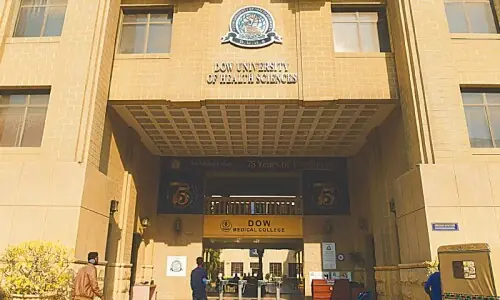
LARKANA: Speakers at a literary sitting showered praise on feminist poet and women rights activist, Attiya Dawood, and said she had boldly advocated rights of the oppressed women and waged a consistent struggle against black custom of honour killing through her writings.
They were speaking at the sitting with Attiya Dawood organised by Anis Ansari Academy in collaboration with Arts Council of Pakistan on the council’s premises late on Wednesday night.
Mukhtiar Jagirani said in his introductory note that Attiya had boldly expressed bitter realities of life in her many books and talked about the physical and mental torture a woman had to suffer at the hands of made-dominated society.
He referred to her autobiography in Urdu titled Ainay kay saamnay (before the looking glass) published by the Oxford University Press and said she had remained faithful to her vision through all ups and downs of life without forgetting her rural background.
Rizwan Gul, head of the ACP’s literature section, said that Attiya firmly believed in sustained struggle for the rights of women. She portrayed with compassion pain and agony of rural women and bravely touched issues of honour killing in a male-dominated society, he said.
Speaking about her artistic endeavours, technique and contents of poetry, Ghulam Akbar Leghari, Larkana commissioner and chairman of ACP, said that women rights organisations focused on achieving equal rights for women in a male-dominated society.
Unfortunately, he said, Sindhi society was not ready to give woman her due place in society because of certain traditional and cultural taboos.
She had struggled for over 30 years to get women their identity and paved the way for other female writers to follow in her footsteps, he said.
Akhlaque Ansari, renowned short story writer and playwright, recalled his 35-year long association with Attiya’s husband Khuda Bakhsh Abro who was himself an artist, illustrator and cartoonist, and said she chose her role and started walking the difficult path.
Despite her traditional rural background she did not flinch from limelight and spoke boldly about injustices to women and the treatment meted out to them in society, he said.
Though, he said, she became part of urban life but she preferred to remember her rural background and feel agonies of womenfolk. She had never disowned her past at any stage of her life, said Mr Ansari.
He said that with due respect to Attiya’s ideas about feminism, he believed Sindhi man was a big feminist. He cited Shah Abdul Latif Bhitai’s poetry who had sung women with love and turned them into a symbol of love, sacrifice, commitment and patriotism.
He said that Attiya was an icon of struggle against jaundiced ideas and approaches and spoke about other books written by her like Raging to be free, Sharafat jee pul siraat, Sindh ki aurat sapnay say sach tak.
Towards the end, Attiya took the dais and said: “I am proud to be a feminist poet but I am afraid male-dominated society interprets it wrongly.”
She said that critics, particularly men, only poured scorn on her writings and found negativity in her work. But even this kind of criticism failed to stop her march to her objectives, she said.
At one stage, she admitted, such negativism had discouraged her to the extent that she had started pondering over quitting writing for good. But her husband Khuda Bakhsh Abro and other friends encouraged and inspired her not to do so, she said.
“I am happy today as I stand here and see the point from where I had started,” she said adding that her daughter Suhaee, a known classical dancer and actress, was her continuity.
She criticised male writers for their hyperbolic comments in forewords to female writers’ books and said “it will be a great achievement if we only succeed in providing a degree of breathing space to women”.
The sitting ended with a dancing performance by Suhaee Abro to the recitation of Attiya’s Urdu poem. Saeed Tunio and Riaz Soomro sung her poetry and she was presented Anis Ansari Academy shield by Prof Shabroz Sandelo.
Published in Dawn, May 20th, 2016


































